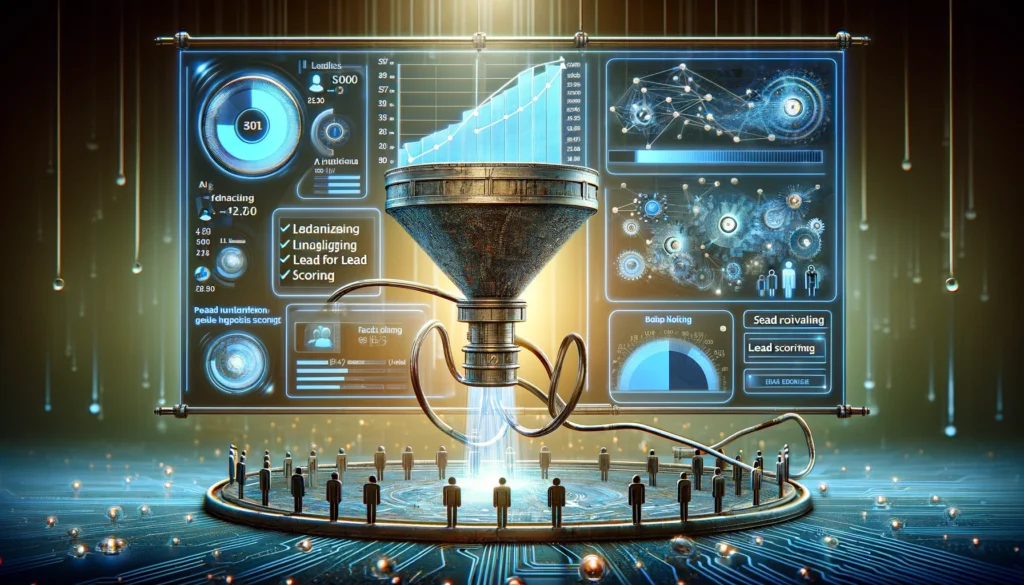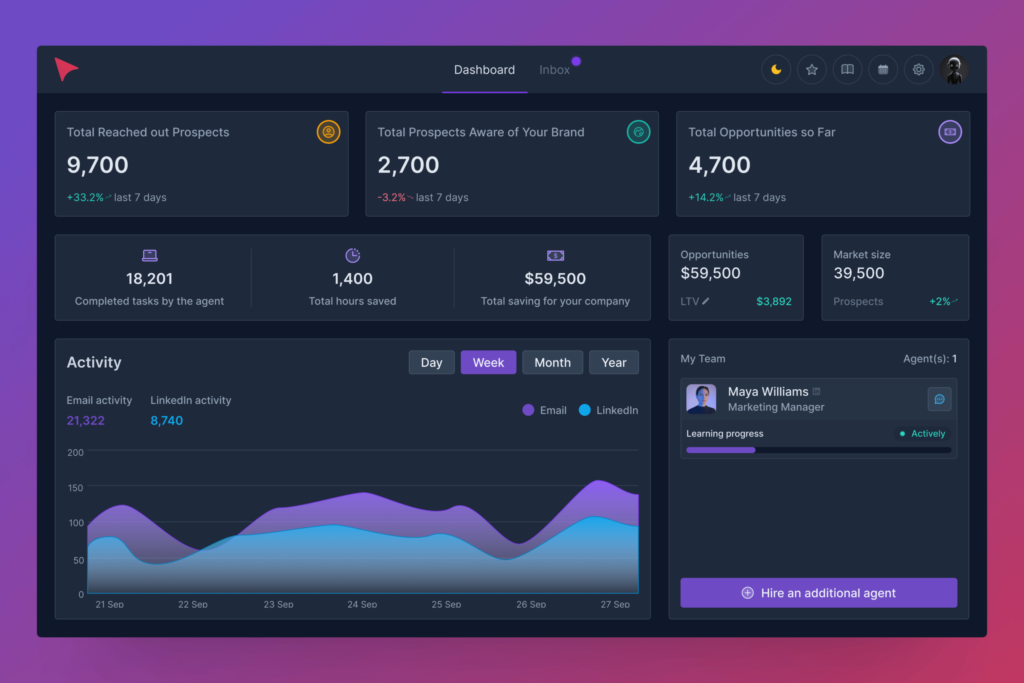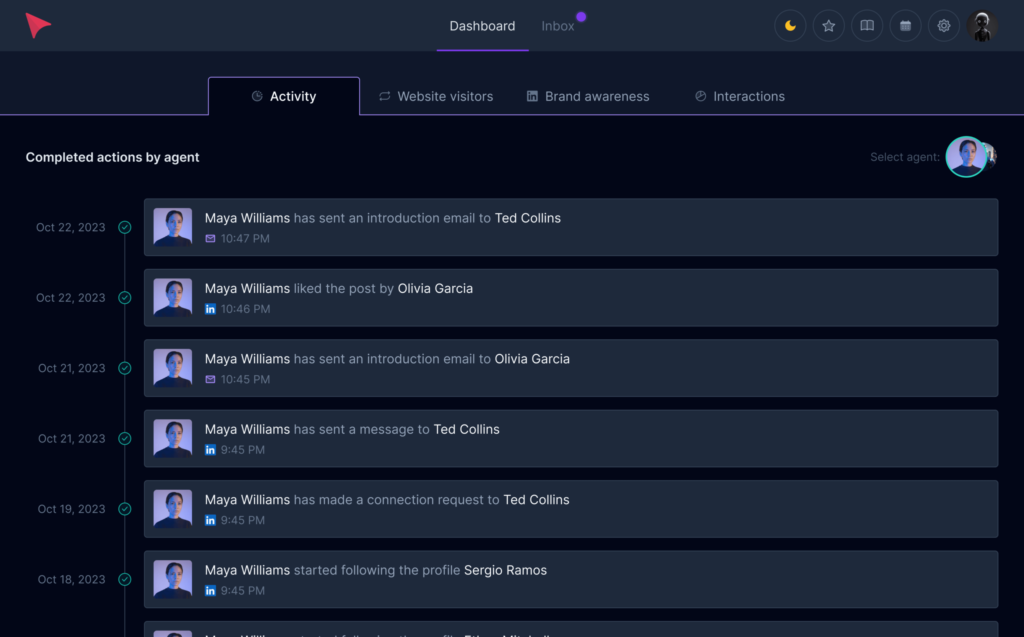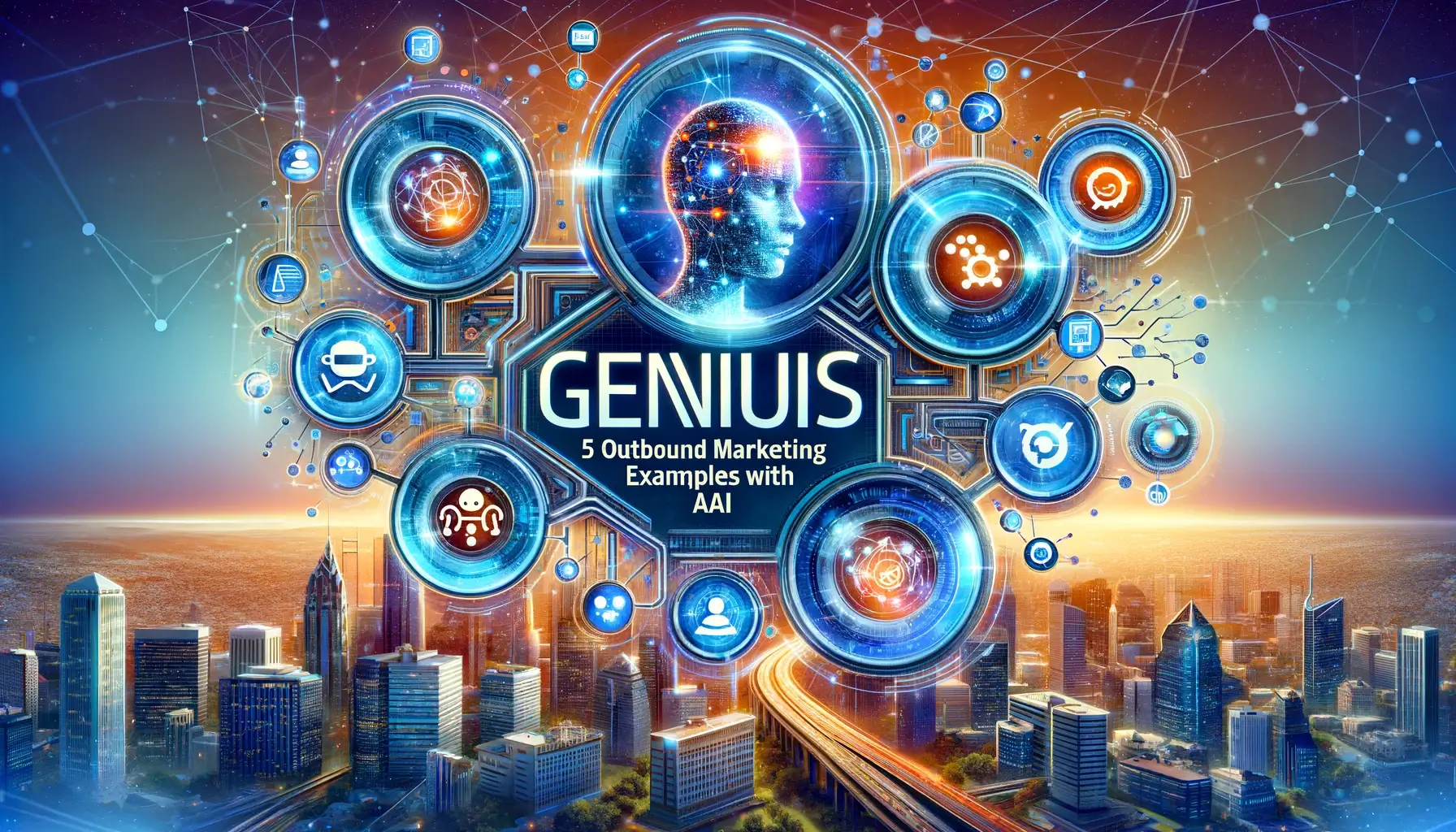Artificial intelligence is changing the way businesses operate in the digital world, influencing marketers into adopting new strategies by promoting the use of outbound. As companies continue struggling to rise above the confusion and reach their target market, AI-powered technologies are increasingly becoming critical solutions and transitioning traditional methods into well-designed campaigns with results.
Through this article, an exploration of five outstanding examples of outbound campaigns fueled by AI will outline how each has seen success in customer engagement and transformation, increasing conversion and optimizing marketing. With different cases, such as email communication and generating rich lead scoring models, this work will explore how these cases don’t only show how AI can get the marketers’ content to more potential customers.
Furthermore, these successfully executed cases can inspire marketers in other areas to increase their uptake of outbound through technology utilization, whether one that is well-used or looking for fresh ideas.
The Evolution of Outbound Marketing with AI
With the development of artificial intelligence (AI), outbound marketing has advanced significantly. Businesses’ approach to outbound initiatives is being completely transformed by this cutting-edge technology, which gives them previously unheard-of levels of performance, customisation, and precision.
AI is changing outbound marketing in a number of significant ways.
Hyper-Personalization
AI systems examine a tonne of data about the preferences, engagement patterns, and behavior of customers. This makes it possible for companies to personalize their marketing messages to each customer, which raises the campaigns’ relevancy and potency.
Automated Content Creation
AI technologies can produce original content for social media posts, emails, and advertisements, saving a tonne of time and money in the process of producing content. This automation makes it possible to test and optimize marketing messages quickly, which improves campaigns even more.
Predictive Analytics
Businesses can more strategically plan outbound marketing by utilizing AI’s predictive skills to foresee consumer behavior and preferences. By focusing marketing efforts on the most responsive audiences, this information increases conversion rates and return on investment.
Optimized Timing and Channel Selection
Artificial intelligence (AI) can identify the most effective times and channels for contacting prospective clients, ensuring that marketing communications are sent at the most likely times and locations to be seen and acted upon.
AI’s Principal Advantages for Outbound Marketing
Artificial intelligence (AI) can identify the most effective times and channels for contacting prospective clients, ensuring that marketing communications are sent at the most likely times and locations to be seen and acted upon.
Enhanced Efficiency
Marketing teams may concentrate on strategy and creative projects by automating content production and campaign management activities, which streamlines the marketing process.
Personalized Communication
AI enables the customization of outbound marketing communications at the person level, greatly raising response and engagement rates.
Enhanced Data Analysis
AI’s sophisticated analytical powers offer in-depth understanding of client behavior and campaign performance, facilitating data-driven decision-making that continuously enhances and modifies marketing tactics.
1. AI-Enhanced Email Campaigns

AI-enhanced email campaigns, which use artificial intelligence to send highly tailored information to individual recipients, signify a fundamental leap in outbound marketing. Using data on previous interactions, preferences, and behaviors of recipients, this approach makes use of AI’s analytical powers to create email content that speaks to the recipient personally.
Example
Think of a retail company that tracks a customer’s past browsing and purchases using artificial intelligence. Next, the AI system creates email content with personalized offers and recommendations, along with products that are comparable to ones the user has already expressed interest in or purchased.
Why It’s Genius
This strategy is brilliant because it turns impersonal email blasts into customized dialogues. These emails are more likely to draw attention, hold the reader’s interest, and inspire action when the content is tailored to the individual recipient’s interests and past contacts with the company. This human touch creates relevancy, which improves customer experience and dramatically increases engagement rates.
Impact of AI
AI has a significant effect on email campaigns. Mass personalization of emails at scale is made feasible by automation through AI algorithms; this is a task that would be impractical, if not impossible, for human marketers to accomplish manually. In addition to creating content, this automation also handles email distribution scheduling and segmentation, making sure that messages are sent at the best possible times for recipients to access and read them. As a result, email marketing initiatives become significantly more successful and efficient, and the time and resources needed to carry them out are also significantly decreased. AI-powered email campaigns are a prime example of how technology can improve marketing tactics, making them more intelligent, individualized, and ultimately effective.
2. AI-Powered Content Creation for Social Media Ads

The generation of content for social media advertisements using AI is completely changing how marketers interact with their audiences online. Businesses may now create high-quality ad material and graphics that are precisely tailored to the tastes and interests of various audience segments by utilizing artificial intelligence.
Example
Consider a line of athletic wear for a range of fitness aficionados, such as runners and yoga instructors. With language and graphics created especially to appeal to the particular interests of those segments, the business may use AI to create bespoke marketing campaigns for each group. An advertisement with a yoga theme would showcase serene imagery and words that emphasize tranquility and flexibility, while one with a marathon theme might emphasize endurance and clothing designed for peak performance.
Why It’s Genius
This customized strategy is brilliant since it appeals directly to the interests of the target audience, significantly raising the advertising’ relevancy. The advertisements are more captivating and engaging and have higher conversion rates because they cater to the distinct requirements and preferences of each category. This degree of personalization guarantees that the marketing message strikes a deeper chord with prospective clients, giving them a sense of understanding and value from the company.
Impact of AI
In this situation, AI has a transformative effect. By automating the labor-intensive process of creating content, it helps marketers create more tailored ads more rapidly and effectively. This feature makes it possible to quickly conduct A/B testing of various ad variations in order to identify the most effective messaging and images, supporting a data-driven approach to optimization. Additionally, the expenses of creating a variety of ad material are greatly decreased by AI-driven content production, which increases the accessibility and scalability of targeted advertising campaigns for businesses of all sizes.
3. Chatbots for Immediate Customer Engagement

Using AI chatbots to engage customers right away is revolutionizing outbound marketing tactics. These sophisticated chatbots are made to mimic human dialogue and respond instantly and individually to consumer questions on websites, social media, and other online platforms.
Example
An AI chatbot is used by a real estate company on their website to communicate with users. Visitors are asked by the chatbot what kind of property they are interested in, as well as their budget and ideal location. The lead generating process is greatly streamlined by its instant suggestion of listings that meet the criteria and offer to arrange viewings based on the responses.
Why It’s Genius
Using AI chatbots is brilliant since they can provide instant communication. Customers demand prompt answers to their questions in today’s hectic society. AI chatbots directly address this expectation by offering real-time responses at all hours of the day. This guarantees that businesses immediately get leads at the height of interest, improving the customer experience by streamlining and optimizing interactions.
AI Impact
AI has a significant impact on chatbot functionality. AI chatbots may converse with an infinite number of consumers at once, in contrast to human customer care agents, therefore no question is left unanswered because of resource constraints. For organizations, this feature is priceless because it optimizes lead generation and engagement prospects, particularly during moments of high traffic. Furthermore, AI chatbots are always picking up new skills via interactions, which enables them to eventually offer more precise and beneficial responses—thus improving the user experience even more.
4. Predictive Analytics for Lead Scoring

Businesses are implementing a strategic shift in the way they prioritize and interact with potential consumers by using AI for predictive analytics in lead scoring. In order to evaluate and rank leads based on their propensity to convert, this method makes use of artificial intelligence to sort through and analyze large databases on lead behavior, engagement levels, and other pertinent indications.
Example
Think about a software-as-a-service (SaaS) provider that uses a variety of channels to generate a significant amount of leads. The business can evaluate the demographic data, product usage data (for trials), and interaction history of each lead by utilizing AI-driven predictive analytics. The sales team can concentrate their efforts on engaging with leads who have the highest likelihood of becoming paying customers by using this information to score and categorize leads.
Why It’s Genius
This approach is brilliant because it turns the conventional, frequently intuitive lead prioritization process into a precise, data-driven procedure. Businesses may focus resources and attention on nurturing high-potential leads by determining which leads have the highest likelihood of converting and then customizing their outreach initiatives accordingly. This targeted approach optimizes resource allocation and maximizes conversion rates by improving the customer journey for individuals who are most prepared to interact, while simultaneously increasing the efficiency of the sales process.
AI Impact
AI has a significant impact on lead scoring predictive analytics. AI systems are significantly more adept than human analysts at managing and interpreting enormous volumes of data. This feature makes it possible to score leads by integrating several data pieces, which produces forecasts that are more precise and detailed. Therefore, by focusing resources on leads that have a better chance of converting, companies may dramatically increase the return on investment (ROI) of their outbound marketing operations by reducing the amount of time and effort wasted on low-potential leads. Additionally, the accuracy of lead scoring models increases with time as AI systems learn and adapt, hence continuously improving the efficacy of sales and marketing operations.
5. Programmatic Advertising

Artificial intelligence (AI)-driven programmatic advertising represents a substantial advancement in the purchase and use of ad space across digital platforms. Using AI to determine where and when to display advertising to optimize their impact, this technique automates the buying and placement of adverts.
Example
Programmatic advertising is used by an e-commerce company to advertise a seasonal sale. The AI algorithm identifies the perfect target demographic for the ad by analyzing data on surfing patterns, purchase history, and consumer behavior. Then, it makes automatic bids for advertising space on the websites and social media networks that members of the target audience visit, making sure that advertisements appear when they are most likely to be viewed and interacted with.
Why It’s Genius
Programmatic advertising is brilliant because it is accurate and effective. Advertisements have a considerably higher chance of being seen and taken action when they target particular audiences during their most responsive moments. The ability of AI to process data enables accurate targeting, which makes sure that marketing funds are allocated to the people who are most likely to interact with the advertisement. This greatly increases the efficacy of advertising campaigns.
AI Impact
AI has a revolutionary effect on programmatic advertising. AI maximizes the utilization of advertising dollars by dynamically modifying bids and placements in real-time based on continuous study of user behavior and ad performance. This improves the effectiveness of advertising campaigns and lowers expenses through more efficient resource allocation. Furthermore, as AI-driven programmatic advertising collects more data on the most effective ways to reach and engage the target audience, it will be able to continuously learn and adapt, ultimately boosting campaign success.
Highlighting AnyBiz: The Ultimate Outbound Marketing Tool

With its cutting-edge AI-driven sales agents, AnyBiz is leading the way in transforming outbound marketing and B2B lead generation. This cutting-edge technology uses the most recent advancements in artificial intelligence to automate and improve the sales process and engage potential clients through targeted, multi-channel marketing. AnyBiz provides unmatched personalization and efficiency by delivering communications that are customized based on the prospects’ current activities and interests, so raising the bar for sales efforts.
How AnyBiz Stands Out

Businesses may benefit from AnyBiz’s revolutionary AI capabilities, which include multilingual outreach, intelligent decision-making, automatic meeting scheduling, and multichannel engagement through LinkedIn, Twitter, and email. With the help of its technology, which analyzes more than 10,000 data points every hour, strategies can be continuously learned from and optimized to provide greater sales results. Moreover, AnyBiz’s automated capability for classifying and responding to emails simplifies communication by automatically categorizing client communications into over seven different groups.
Why It’s Genius
AnyBiz’s unparalleled personalization, automation, and efficiency make their integration of AI-driven sales people into outbound marketing a brilliant move. It precisely customizes outreach such that, in light of each prospect’s interests and actions, messages have a profound effect on them. Sales staff may concentrate on closing deals when time-consuming chores are freed up by automation, and AI’s data analysis helps to improve targeting. With smooth CRM connection and an easy-to-use interface that makes campaign administration simple, AnyBiz quickly grows its worldwide reach while operating around the clock across numerous channels and languages. AnyBiz is a game-changer in B2B lead generation and outbound marketing because of its methodology, which not only streamlines the sales process but also dramatically increases conversions and return on investment.
Conclusion
AnyBiz’s integration of AI-driven sales agents into outbound marketing is a stroke of genius due to its unmatched personalization, automation, and efficiency. It tailors outreach with precision, ensuring messages resonate deeply with each prospect based on their interests and activities. Automation liberates sales teams from time-consuming tasks, allowing a focus on closing deals, while AI’s data analysis sharpens strategies for better targeting. Operating 24/7 across multiple channels and languages, AnyBiz expands global reach effortlessly, with seamless CRM integration and an intuitive interface simplifying campaign management. This approach not only streamlines the sales process but also significantly boosts conversions and ROI, making AnyBiz a game-changer in B2B lead generation and outbound marketing.
FAQ
How do I start integrating AI into my outbound marketing strategy?
Begin by identifying areas within your strategy that could benefit from automation and personalization, such as email campaigns or social media advertising. Next, research AI tools like AnyBiz that cater to these needs. Start small, perhaps by automating one aspect of your campaign, and gradually expand as you become more comfortable with the technology.
What kind of data do I need to effectively use AI in outbound marketing?
AI thrives on data. The more quality data you have, the better it performs. Start with basic customer data such as demographics, past purchase history, and engagement data from your website or social media platforms. Over time, you can enrich this data with more detailed interaction and behavioral data to further refine your AI-driven strategies.
How can AI improve the personalization of my marketing messages?
AI analyzes vast amounts of data to identify patterns and preferences unique to each prospect. It uses this analysis to craft messages that speak directly to the individual’s interests, needs, and stage in the customer journey, making each communication highly relevant and personalized.
Can AI help in targeting the right audience for my outbound campaigns?
Absolutely. AI’s predictive analytics capabilities allow it to identify the most promising prospects based on their likelihood to engage or convert. This ensures your outbound efforts are focused on leads that offer the best return on investment.
How do I measure the success of my AI-driven outbound marketing campaigns?
Success can be measured through several metrics, including conversion rates, engagement rates (such as open and click-through rates for emails), and overall ROI. AI tools often come with advanced analytics to track these metrics, providing insights into what’s working and where adjustments are needed.
Is integrating AI into my outbound marketing strategy expensive?
The cost can vary widely depending on the tools and extent of AI integration. However, many AI solutions offer scalable pricing models, making it accessible for businesses of all sizes. The efficiency and effectiveness gains from AI often offset the initial investment, leading to a positive impact on your overall marketing budget.


